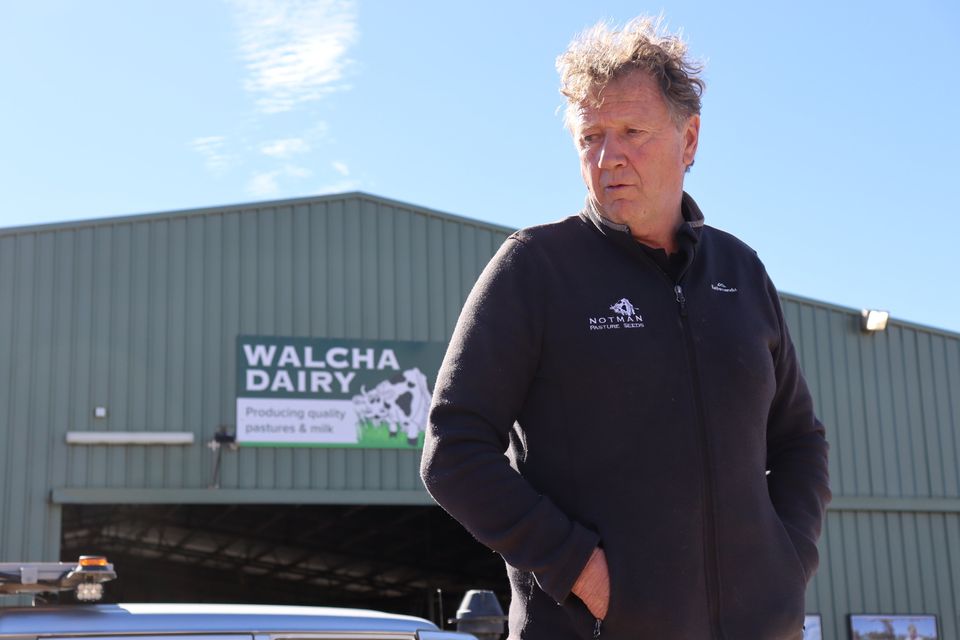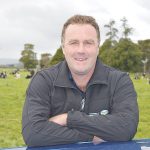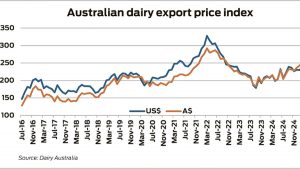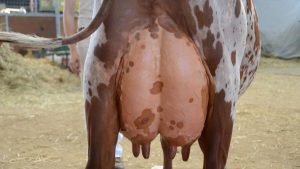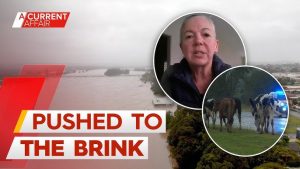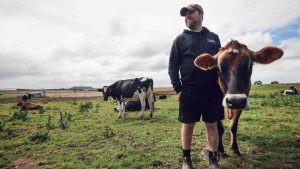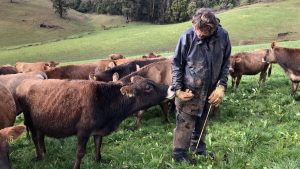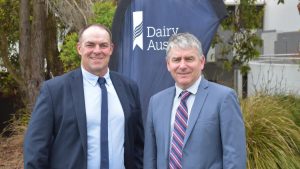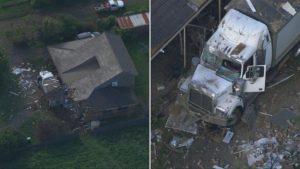
Peter Notman bought a second premises and built a milking enterprise from scratch after spotting a supply-chain gap in the market in Queensland.
Dairy farmers Peter and Elaine Notman milk 1,600 cows across two farms in eastern Australia, with the two herds separated by a 15-hour drive.
Peter has also been owner at Notman Pasture Seeds since 1987, focusing on bringing the latest plant genetics into farmers’ hands.
With over 40 years’ experience dairy farming in Poowong, Victoria, in 2007 the Notmans took the opportunity to buy their second farm, 1,217 metres above sea level, just outside Walcha, New South Wales.
“I travelled to Armidale to talk at a conference and while there, it was suggested he have a look at the farm. I saw good, flat land, three-phase power and realised there was good rainfall,” Peter tells a group of Nuffield Scholars who visited the farm in June.
“I also was aware that the south-east Queensland milk supply was declining faster than the growth required. I walked all over the farm here and I dug up a bit of gravel and thought it’d be good enough to make tracks.
“We decided we’d set this farm up to supply milk to Brisbane because I was sick of the world export market.”
After taking ownership of the new farm, Peter and his team started taking what was a green field site in 2008 and built it from scratch in under six months.
“We transported 780 cows 1,300km and then they got milked here that day,” he says. “It was a big trip to shift cows that far and we didn’t lose one.
“The first couple of years, we had some pretty big freeze-ups. The turntable wouldn’t even spin on the rotary, the wheels were icing up and we had to get the big John Deere tractors at the side doors with the chains and give it a pull start.
“We have since bought some big diesel heaters and they just work off a thermostat in the shed and the minute the shed gets to nought degrees, the four heaters kick in and defrost all the plant.”
If minus temperatures are expected overnight, staff will set the rotary turning so it’s constantly moving in front of the four diesel heaters.
“We send over 20,000 litres of milk to Brisbane every day. It’s a 16-hour round trip — a long way to cart milk. We have the capacity to hold 80,000 litres here,” he says.
“The driver rolls in at 4am, has a snooze and then gets up at 8am and pumps the milk, and then gets on the road up to Brisbane.
“All we want to do here is produce milk. The good thing about what we’re doing is we know what the income is going to be a bit ahead because we have a three-year contract. It’s worth over AUS $0.85/L at the moment (€0.52/L).
“They can’t get milk in Brisbane easily and a lot of the farmers are older with smaller farms, and are along coastal areas and up valleys with two floods every year.
“They’ll tell the dairy company that they’re not paying them enough and then the dairy company gets annoyed with them.
“We locked in with them for three years and we’ve got two full years to go.
“At the moment, Victorian milk prices are going down and the average farm of this size is getting paid about AUS $9.60 per kilogram of solids, or nearly AUS $0.70/L. We are getting AUS $13/kg.”
The Walcha farm has 889 cows currently calving in three batches, starting on the ninth of January, May and September.
The farm is aiming for 45-day calving blocks, using short gestation bulls. The milking platform is 1,000ac along with an out block of 500ac.
“The areas that would be the hardest to manage would be, like any farm, people management. When you’re having people starting here early in the morning, not everyone loves doing that,” says Peter.
“Two people work in the parlour at milking time. We have two Irish working on the farm at the moment, securing their visa.
“Because we’re only dairy up here, you can’t just go down the road to your mate and borrow things, so we have to have every spare that runs the place. Then you’ve got to teach yourself and your staff to be able to do it all as well.
“We’re dairy farmers/dairy technicians here now. We can virtually build one of these things because we’re so far isolated out here.
“Some may look at agriculture and say there’s no value in it, but maybe I could live up there two kilometres away from anyone, and I can have a nice long track if I want to become a hermit.
“Staff either do a morning shift where you come in at 3am and work until lunchtime. A couple of the guys work every weekend because their families are back in West Java, Indonesia.
“They have Monday, Tuesday off, so they’re happy with that because they’re not going to party on the weekend, or [have] friends to go and visit or whatever. We set staff pay that bit higher so no one in Victoria can poach them.”
Peter, along with his wife Elaine, bought their first farm when they were just 21.
“I left school at 14, so by the time we were 21, we had over $40,000 savings between us,” he says.
“When I talk to my grandchildren, and they’re all in their mid-20s, they all tell me ‘ah but Peter, it’s impossible now’.
I say to them ‘ah well, it’s those six coffees you have during the week and those two parties you went to’.
“I say the only thing I can tell you is that you should, in your 20s and 30s, be earning twice as much as you’re actually spending. I tell them they should be putting money away or buying something, and if you’re not, don’t blame me if you get old and you’re poor.
“Some people grow up with more opportunities. It doesn’t matter, it’s just a matter of what you make of your opportunities.
“We were very naive because I still remember going to the bank and telling them that I want to take out my wife’s and my money in cash. He said, ‘what are you doing with this’ and I told him I was buying a farm.
“He asked if we had it signed up and I said ‘no, the guy’s really old, he’s dying and he wants us to buy it’.
“I said that I was going to get a job at a milk factory and would be nursing so we can actually afford to buy this farm.
“We only got it signed by a solicitor four months after we took over the farm. We just gave him AUS $41,000 cash.
“He wrote it down that I gave it to him and we all agreed that we had given him the money, which you wouldn’t do today.”
You can now read the most important #news on #eDairyNews #Whatsapp channels!!!
🇺🇸 eDairy News INGLÊS: https://whatsapp.com/channel/0029VaKsjzGDTkJyIN6hcP1K
